Auto logout in seconds.
Continue LogoutThe challenge
Referring providers face barriers to ensuring their patients receive aortic valve replacements (AVR) in a timely manner, such as uncertainty about who and where to refer and concerns about the risks. To address these challenges, programs traditionally rely on forums like lunch and learns and symposiums. These are valuable, but don’t engage providers in their patients’ treatment or support long-term referrer relationships.
The organizations
- Overlake Medical Center is a 349-bed non-profit regional medical center based in Bellevue, Washington. Their cardiothoracic surgery clinic is staffed with three physicians and four physician assistants.
- Henry Ford Health has over 250 locations throughout Michigan, including five hospitals. The first transcatheter aortic valve replacement (TAVR) in the U.S. was performed here. The structural heart team at the Henry Ford Heart and Vascular Institute is comprised of twelve physicians, six nurse practitioners, and one physician assistant.
- TriStar Centennial Medical Center is a 741-bed facility that is part of TriStar Health, an 11-hospital health system serving Tennessee and southern Kentucky. Structural heart procedures are performed at the TriStar Centennial Heart & Vascular Center, which has 21 physicians and one nurse practitioner.
The approach
Structural heart programs can improve their provider outreach strategy by involving referrers in heart team meetings throughout their patients’ care journey, utilizing a tracking platform to identify at-risk referrers, and streamlining referrer and heart team communication through a standardized communication channel.
The result
By enhancing the provider outreach strategy, structural heart programs have achieved greater engagement and buy-in from referring providers, growth in AVR volumes, reduced time-to-treatment, and improved satisfaction for both referrers and schedulers.
While structural heart volumes are growing, programs must capitalize on opportunities to better engage, support, and communicate with referrers to maximize volume potential. We’ve identified three strategies to achieve this.
The three strategies
Overlake Medical Center (Overlake) improved its referrer engagement strategy by involving referrers in the AVR care pathway. Overlake recognized that the responsibility for sustaining referral relationships should not fall solely on the physician liaison, but to all staff who touch the AVR patient journey. To implement this strategy at your organization, follow two steps.
Step 1: Align staff on referrer engagement strategy
Develop a referrer engagement strategy that aligns staff through a shared, common mission. For example, Overlake identified three mission-critical goals that are essential to their staff and are foundational to their referrer engagement strategy.
These goals also address referrers’ top concerns, improving referrers’ confidence in Overlake and building strong relationships.
Key considerations for a framework
- Components that are critical to your mission
- Where your organization has seen the most success
- Program staff input
- Needs of your referrers
- Needs of your patients
Overlake’s referrer engagement framework: Three ways referrer buy-in is achieved
1. Collaborative care decisions
- Referrers are engaged early in the patient journey and are involved in the decision-making process
2. High-quality care
- Transparency on quality outcomes helps build referrer trust
3. Strong patient experience
- Overlake places a consistent emphasis on patient experience when meeting with referrers to foster buy-in
Step 2: Identify forums to involve referrers in patient journey
Engage referrers by inviting them to forums throughout the patient journey. Select forums that highlight your engagement strategy goals (such as quality), are collaborative, and have a recurring cadence to build lasting relationships. Overlake engages referring providers by inviting them to three different forums Including valve clinic meetings, quality and leadership meetings (e.g., cardiac quality or leadership meetings), and one-on-one touchpoints (e.g., meeting with referrers after in-person meetings).
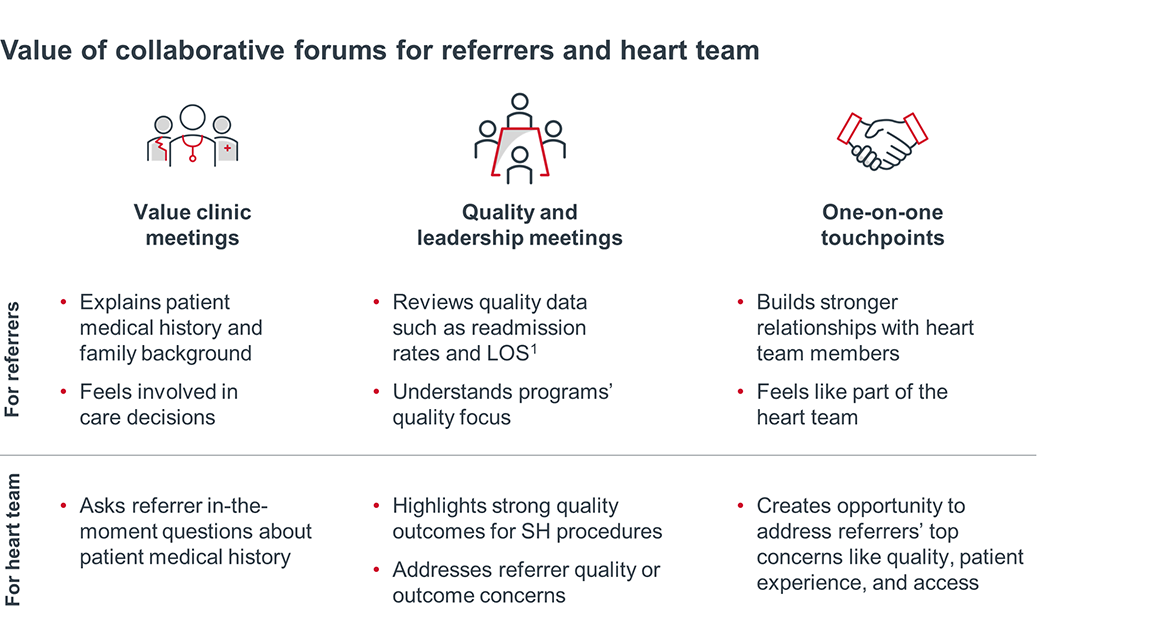
Results
Overlake’s provider outreach strategy has helped secure long-term program buy-in from referrers. It fosters a team dynamic where specialists and referrers operate under a shared set of values, making referrers likely to continue referring to Overlake and encourage others to do the same. When referrers experience the program for the first time, they see what it can do for their patients and feel like part of the program.
Henry Ford Health’s structural heart program improves referrer engagement by proactively identifying and supporting referrers who have procedure questions or program concerns. They do this by leveraging a tracking platform and feedback from the program’s outreach RNs and structural heart physicians. Follow these steps to implement this strategy.
Step 1: Establish dual-level accountability metrics to track referral performance
Establish a clear definition of what successful referral performance looks like and the metrics you will use to track this at the program and outreach RN level. Tracking metrics at both levels provides a holistic understanding of referral performance. Henry Ford Health tracks these metrics:
Program metrics
- Number of new appointments created
- Number of outpatient consultations
- Number of new medical record numbers
Outreach RN metrics
- Number of weekly office visits made
- Number of events planned for specialists and referrers (e.g., lunch and learns, dinners, and presentations)
They track program-level data in the EMR and can sort it by referring provider to uncover changes in referral patterns for each provider.
Outreach RN job description
An outreach RN or Nurse Outreach Coordinator functions as the liaison between the referring physician and specialist. Primary responsibilities include planning events for referrers and supporting referrer-specialist relationships.
Outreach RNs share a monthly email with the team to provide updates on outreach performance and intel on referrer relationships. They meet with the administrator to discuss performance and share insights on referrers such as feedback on communication and access to appointments and procedures.
Sample email scripting points
- Are referrers receiving communications from Henry Ford?
- How is access to appointments and procedures?
- How long is it taking for a patient to be scheduled?
Step 2: Create a centralized tracking platform to track referral performance and identify opportunities for improvement
Next, create or designate a data platform to track referral performance. Programs can use an existing data platform, invest in a new one, or create a DIY version in the interim. When making the case for a new platform, emphasize its role in benchmarking program performance over time to provide a holistic picture of referral patterns. Henry Ford Health uses their platform to track referral performance and proactively address drops in referrals.
Organizations must select stakeholders to review data at regular intervals. Henry Ford Health reviews data monthly during their referral strategy leadership meetings with the Referring Physician Office (RPO) director and Outreach RNs. The RPO director has the most knowledge on overall referral patterns, while Outreach RNs have the most insight on individual referrer relationships. This makes them best suited to review and provide strategy recommendations.
Structural heart programs should also receive feedback from its physicians on referral trends. Henry Ford Health does this by meeting with their structural heart physicians quarterly. During these meetings physicians share their experiences with referrers whose patients they’ve cared for.
Step 3: Identify outlier data points to tailor interventions for at-risk referrers
Use insight from the data platform, outreach RNs, and structural heart providers to better understand who is an at-risk referrer and why. At Henry Ford Health, the outreach RN is instrumental in repairing referrer relationships. They reach out the referrers to provide tailored support and mend the relationship.
Tactic in action
When an anatomically challenging patient received a TAVR using an investigational device, referral data revealed that the referrer stopped sending patients to Henry Ford Health. Since this data was captured, an outreach RN was able to reach out to mend the relationship. They did this in three steps:
1. Reached out to the physician regarding the decline in referrals
2. Met with the physician and uncovered concerns about the investigational procedure the patient received
3. Addressed concerns about procedure and repaired the relationship
Results
Henry Ford Health created performance accountability at the program and individual levels, established new referral relationships, and enhanced existing relationships by proactively identifying and addressing concerns. This led to growth, as Henry Ford Health generated 324 structural heart appointments from external referrals in 2021. While not structural heart specific, these strategies helped their RPO connect with nearly 2,000 referrers in 2021.
Digital solutions that enhance the referral experience are becoming more widely available. These solutions help organizations win over referrers and play a role in streamlining the referral process. TriStar Centennial Heart & Vascular Center (Centennial) recognized this and invested in a cloud-based tool to create a single platform for communication between referrers and structural heart physicians. Previously, the referral process was slow and involved several rounds of communication which increased time to treatment and could lead referrers to send patients elsewhere.
Step 1: Message the benefits of the platform to secure stakeholder buy-in
When making the case for a single communication platform, start by securing buy-in from IT. Next, ensure utilization by socializing the platform and communicating its benefits with structural heart staff and referring providers. Finally, share data from other service lines or organizations that are using the platform to further emphasize its value.
Benefits of a standardized communication channel
Heart team benefits
- Have a single place for all patient-related information and communication
- Ability to quickly communicate with the referrer
Referrer team benefits
- Easily share medical records and images
- Communicate real-time with schedulers and structural heart team
- Have access to the structural heart schedule and postprocedure imaging and results
Step 2: Build IT infrastructure based on resources and staff preferences
Develop a communication platform by considering available resources and features that are important to your staff. This platform should streamline communication between referrers, structural heart physicians, and schedulers. Centennial’s tool does this through a three-step communication pathway.
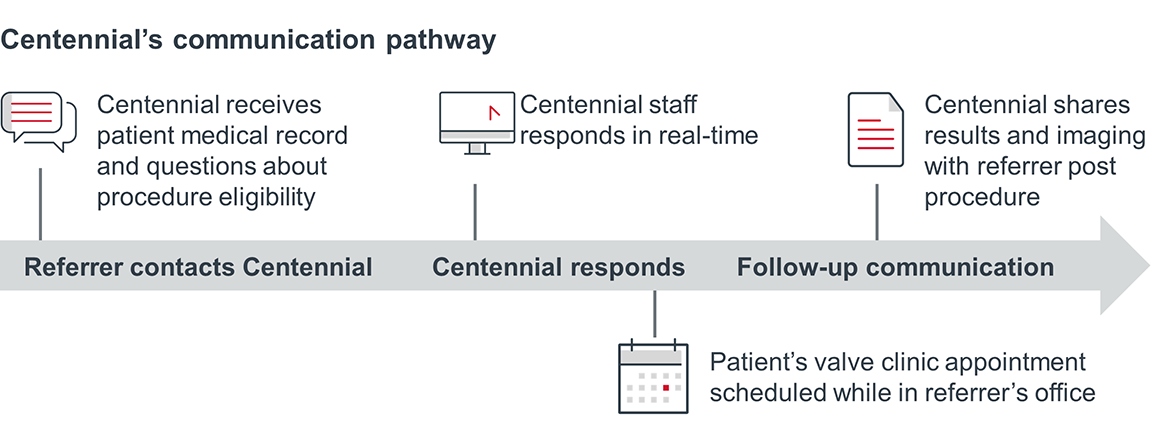
When developing or selecting an application, consider:
- Security: At a minimum, any health data exchanged on the platform should be encrypted to ensure security, HIPAA compliance, and protect patient information.
- Platform type: Select either a standalone platform or one that can be embedded into your EMR depending on budget, urgency, implementation timeline, and ability to provide training to your staff. The platform is ideally embedded into the EMR, making it more seamless for staff to use.
- Functionality: The platform should allow two-way communication between the heart team and referrers through messaging and the exchange of medical records, images, and test results.
- Staff needs: Identify and incorporate components that are most important to staff and ensure they utilize the platform over time.
Launch the platform in phases and adjust it based on feedback before full implementation. Centennial tested its platform in 30- and 60-day pilots. These demonstrated its potential to close communication gaps and provide immediate access for referrers.
Step 3: Adapt communication timelines based on platform functionality and physician workflow
Staff must review the platform at regular intervals so that communication happens in a timely manner. Ideally, staff respond to messages when they arrive. Centennial enabled their platform to send notifications to structural heart providers when they receive a message so they can reply in real-time. For platforms that do not have a notification feature, determine a cadence for reviewing and responding to messages based on physician workflows. This prevents unnecessary communication delays so that providers have the information necessary to develop a treatment plan.
Results
Centennial Heart and Vascular Center’s cloud-based communication application streamlined the referral process and increased referring provider engagement. Since the platform’s implementation, leaders have seen improvements in:
- Growth in structural heart volumes
- Timeliness to treatment
- Referrer satisfaction
- Scheduler satisfaction

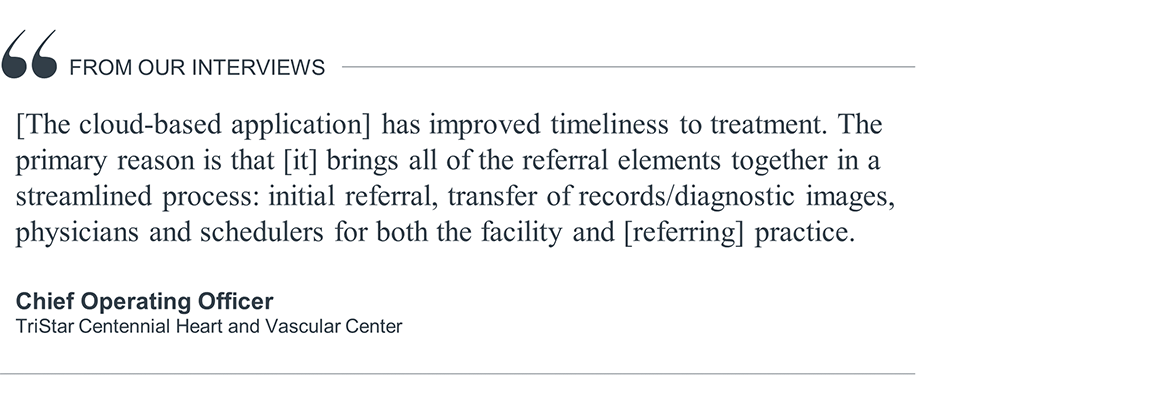
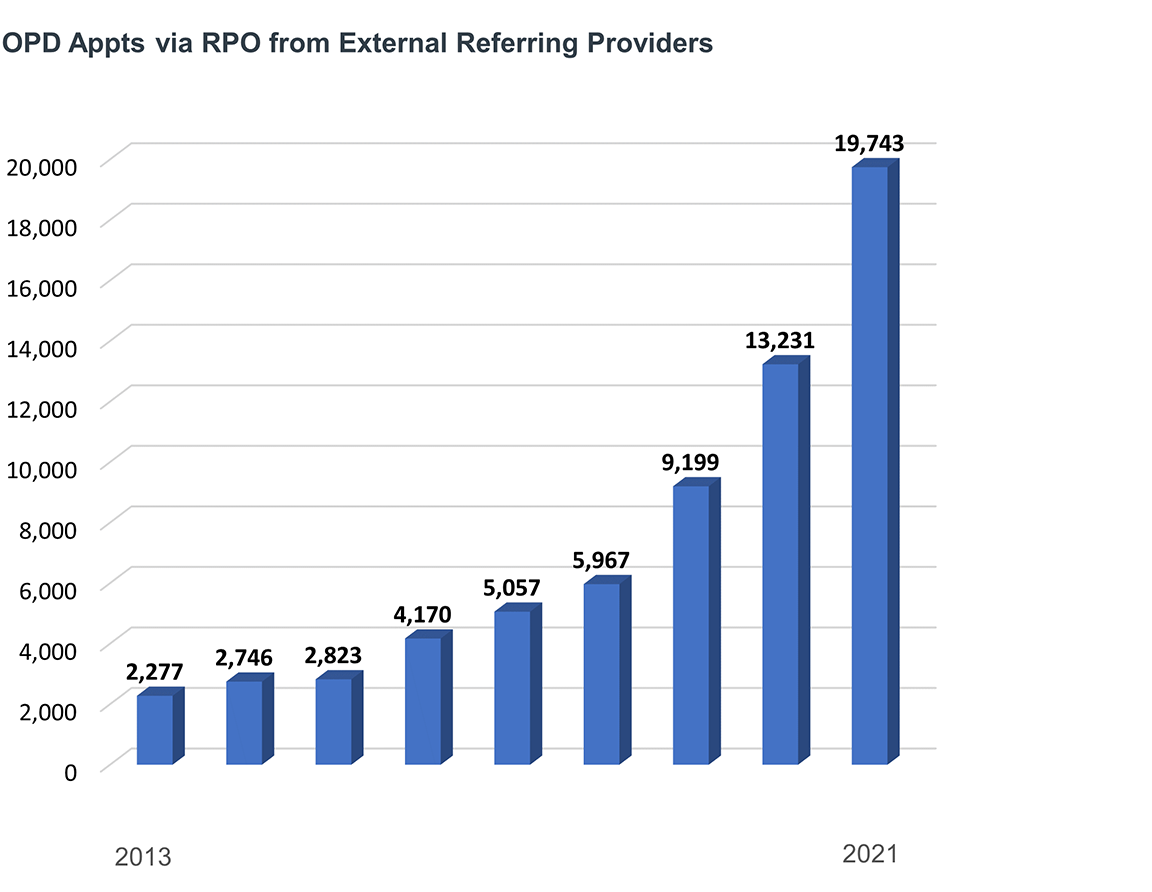
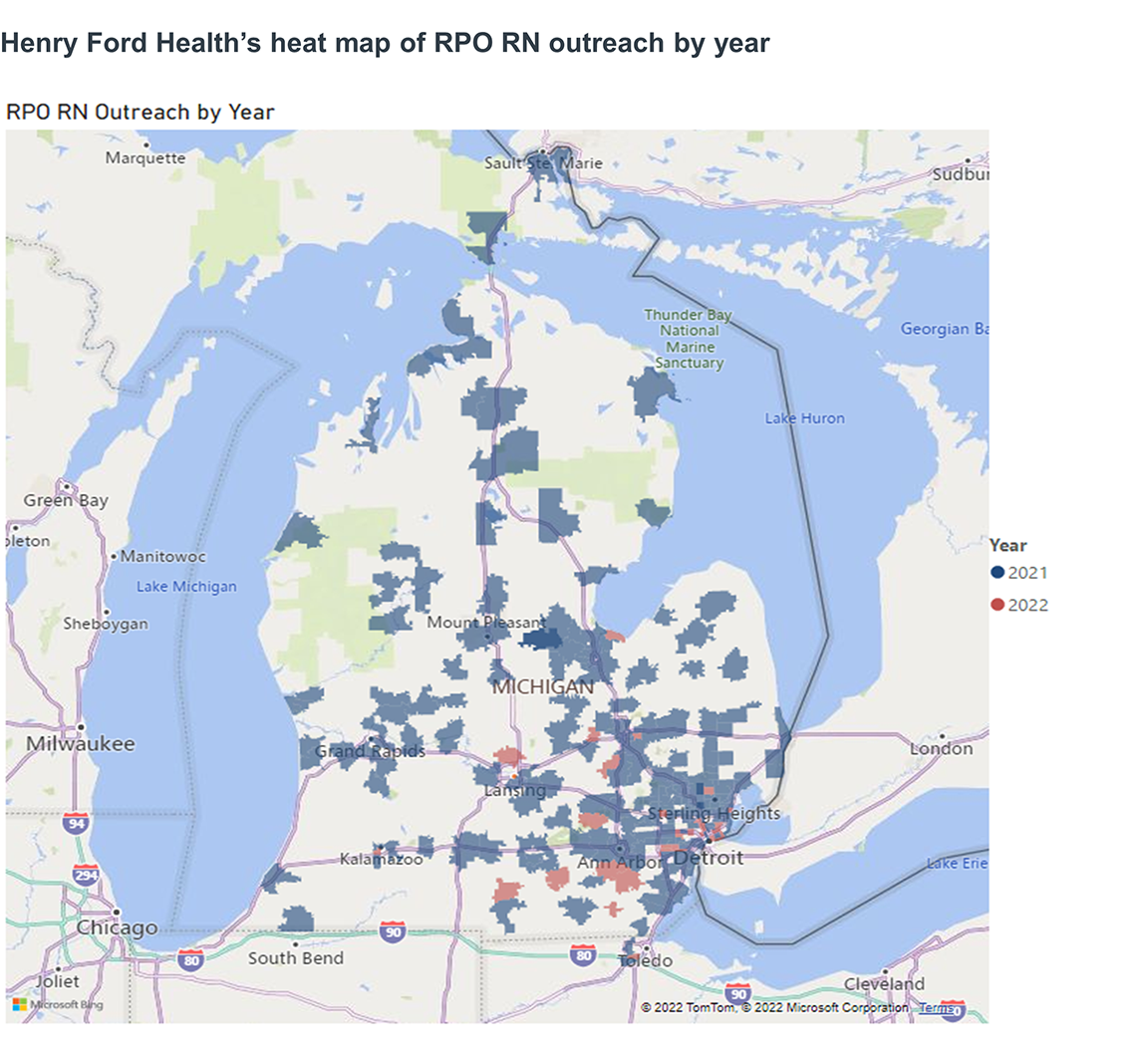
Edwards Lifesciences is the global leader in patient-focused medical innovations for structural heart disease, as well as critical care and surgical monitoring. Driven by a passion to help patients, the company collaborates with the world’s leading clinicians and researchers to address unmet healthcare needs, working to improve patient outcomes and enhance lives.
This report is sponsored by Edwards Lifesciences, an Advisory Board member organization. Representatives of Edwards Lifesciences helped select the topics and issues addressed. Advisory Board experts wrote the report, maintained final editorial approval, and conducted the underlying research independently and objectively. Advisory Board does not endorse any company, organization, product or brand mentioned herein.
To learn more, view our editorial guidelines.

This report is sponsored by Edwards Lifesciences. Advisory Board experts wrote the report, maintained final editorial approval, and conducted the underlying research independently and objectively.
Learn moreDon't miss out on the latest Advisory Board insights
Create your free account to access 1 resource, including the latest research and webinars.
Want access without creating an account?
You have 1 free members-only resource remaining this month.
1 free members-only resources remaining
1 free members-only resources remaining
You've reached your limit of free insights
Become a member to access all of Advisory Board's resources, events, and experts
Never miss out on the latest innovative health care content tailored to you.
Benefits include:
You've reached your limit of free insights
Become a member to access all of Advisory Board's resources, events, and experts
Never miss out on the latest innovative health care content tailored to you.
Benefits include:
This content is available through your Curated Research partnership with Advisory Board. Click on ‘view this resource’ to read the full piece
Email ask@advisory.com to learn more
Click on ‘Become a Member’ to learn about the benefits of a Full-Access partnership with Advisory Board
Never miss out on the latest innovative health care content tailored to you.
Benefits Include:
This is for members only. Learn more.
Click on ‘Become a Member’ to learn about the benefits of a Full-Access partnership with Advisory Board
Never miss out on the latest innovative health care content tailored to you.

